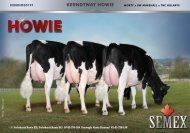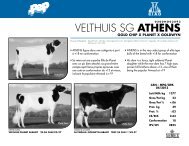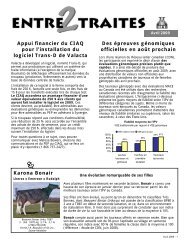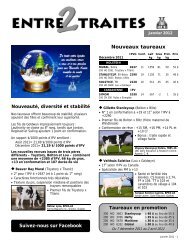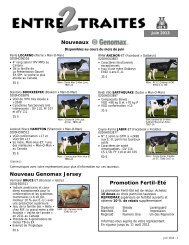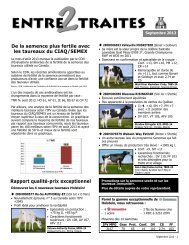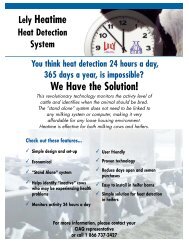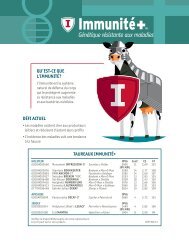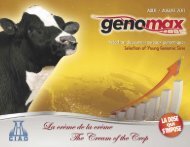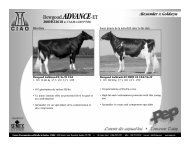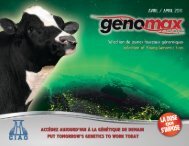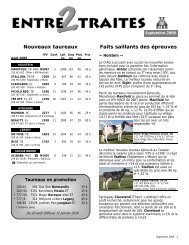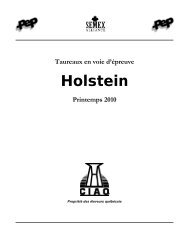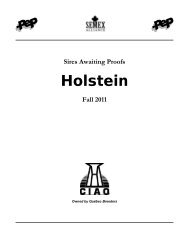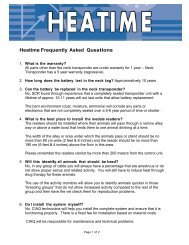Genotest Brochure - CIAQ
Genotest Brochure - CIAQ
Genotest Brochure - CIAQ
- No tags were found...
Create successful ePaper yourself
Turn your PDF publications into a flip-book with our unique Google optimized e-Paper software.
Genomic testing to help you make better management decisions<br />
A genomic testing service for dairy producers offered by<br />
Holstein Canada and Semex Alliance<br />
(Westgen, Gencor, Eastern Breeders and <strong>CIAQ</strong>)<br />
GENCOR
GENOMICS 101<br />
Genomics is the study of DNA, the molecules that carry the genes of each individual. For many in the<br />
dairy genetics industry genomics is anticipated to provide the greatest advancement since the advent<br />
of frozen semen. Genomic testing is a tool which increases the accuracy of predicting an animal’s<br />
genetic merit. The gain in accuracy is largest for younger animals (Table 1). This applies for any trait in<br />
which traditional genetic evaluations exist and leads to new opportunities for making genetic progress.<br />
Canadian dairy producers are well positioned to take advantage of genomics.<br />
OPPORTUNITIES FOR PRODUCERS WHO<br />
USE GENOMIC TESTING<br />
Genomics is a fast and convenient way to more accurately predict the genetic potential of an animal.<br />
With heifer rearing costs in Canada pegged at $2000 or more, being able to make better selection,<br />
culling or marketing decisions at an earlier age can significantly impact on overall herd profitability.<br />
Genomic results provide additional information for producers to make better selection decisions with an<br />
emphasis on accelerating genetic progress. Selecting better sires, perhaps even using sexed semen on<br />
the best heifers are but two examples. Your next generation of females provides the best opportunity for<br />
improving the overall genetic level of your herd.<br />
3
TABLE 1 - AVERAGE GAIN IN LPI RELIABILITY USING GENOMICS<br />
Holsteins<br />
August 2010<br />
Heifers<br />
Young cows<br />
(1 st or 2 nd lactation)<br />
Foreign cows with<br />
MACE in Canada<br />
Average LPI Reliability %<br />
Traditional 50K SNP 3K SNP*<br />
37 65 62<br />
54 69 67<br />
43 67 65<br />
Source: Canadian Dairy Network<br />
* Note: the actual gain in reliability using 3K depends on the information available on<br />
the ancestors of the animal tested<br />
4
ECONOMIC BENEFITS OF IMPROVEMENTS IN<br />
LIFETIME PROFIT INDEX (LPI)<br />
Genomics provides a much more accurate tool for selecting heifers thus increasing the rate of genetic<br />
progress. Lifetime Profit Index (LPI) provides an overall measure of the economic value an animal will<br />
contribute and considers factors such as, production, durability, health, and fertility. Using genomics to<br />
select heifers will increase the rate of LPI progress made versus traditional selection methods.<br />
Table 2 estimates the net economic benefit of using genomics to select replacement heifers. Two main<br />
factors affecting the benefits include the number of heifers available and the number selected for<br />
replacement.<br />
5
TABLE 2 - NET ANNUAL PRESENT DAY ECONOMIC BENEFITS<br />
OF USING GENOMICS FOR HEIFER SELECTION<br />
FOR A 100 HEAD MILKING OPERATION<br />
Number of heifers available<br />
for genotyping over<br />
12-month period<br />
Heifer replacement rate<br />
25% 30% 35% 40% 45%<br />
60 $14,040 $11,900 $9,560 $7,390 $5,180<br />
50 $12,150 $9,560 $6,900 $4,220 $1,320<br />
40 $9,100 $5,900 $2,510 ($1,880) ($1,880)<br />
ASSUMPTIONS:<br />
• Includes the cost to genomically test all heifers using 3K panel at $47<br />
• Every 100 points of LPI gain equals $50 per head per year<br />
• Standard deviation of LPI within heifer population is 550 points<br />
• Economic benefits of heifers delayed two years (till calving) and discounted by<br />
5% per year<br />
6
The benefits of using genomic testing for heifer selection are the greatest when there is a large<br />
number of heifers to choose from and a low replacement rate. The use of sexed semen can<br />
substantially increase the number of heifers available and therefore benefits from genomics.<br />
The economic benefits in table 2 take into consideration the lactations of the<br />
selected heifers but not the additional genetic progress<br />
that these superior heifers will transmit to<br />
their progeny.<br />
KEY OPPORTUNITIES<br />
WITH GENOMICS<br />
A tool to assist in making better management and<br />
marketing decisions<br />
Increased reliability and accuracy of genetic evaluations<br />
Achieve faster genetic progress in your herd<br />
Select the right heifers earlier<br />
Optimize heifer matings<br />
Genomic testing can also supply information on parentage, breed makeup, and actual rather<br />
than estimated inbreeding levels. The science of genomics will continue to evolve and there are<br />
many future opportunities including parentage discovery, traceability, and identifying new traits of<br />
economic importance. What we are experiencing today with genomics is just the beginning.<br />
7
GENOMIC TESTING SERVICE<br />
Holstein Canada and Semex partners are pleased to offer genomic testing of females for all dairy<br />
producers. GenoTest includes 3K and 50K SNP testing as well as the option to submit DNA samples<br />
using hair or nasal swabs. An application for genomic testing can be printed from the Holstein Canada or<br />
Canadian Dairy Network websites.<br />
WHAT GENOMIC TEST (3K or 50K) SHOULD YOU USE<br />
The 3K test evaluates 3,000 SNP while the 50K looks at 50,000. The 3K test provides slightly less accuracy<br />
(~90% of 50K) but costs significantly less. With 3K, the remaining 47,000 SNP are imputed (filled in)<br />
using knowledge about the transmission of SNP in related animals. The accuracy of 3K depends on the<br />
information available from the ancestors. For example: if the sire is tested with 50K and the dam 3K the<br />
accuracy of 3K will be slightly less than if the dam was tested with 50K.<br />
8
GENOTEST FEES PER ANIMAL: SEPTEMBER 2010<br />
Genomic Test<br />
Hair<br />
DNA Sample<br />
Nasal Swab*<br />
3K SNP $47 $42<br />
50K SNP $160 $155<br />
* additional $5 fee for nasal swabs thus making the total cost the same as hair<br />
Foreign animals (not owned by Canadian clients) can be submitted for genomic testing through<br />
a Canadian client for an additional fee of $10.<br />
USE 3K TEST<br />
Herd genotyping to assist in selection,<br />
mating, and marketing decisions<br />
USE 50K TEST<br />
Elite females considered for sale or<br />
merchandising outside of Canada<br />
Pre-screening of females for embryo<br />
transfer or other considerations<br />
Note: Canadian-owned animals tested on either panel will obtain official genomic evaluations<br />
in Canada, as well as any animal submitted for genotyping within the GenoTest program. All<br />
animals in North America genotyped using the 50K panel will receive genomic evaluations in<br />
both the United States and Canada.<br />
9
SHOULD YOU USE HAIR OR NASAL SWABS<br />
FOR DNA COLLECTION<br />
It is up to you to decide which method you prefer. Many producers are comfortable with<br />
using hair for DNA collection. Hair can sometimes pose challenges with younger animals<br />
and also during the DNA extraction process at the lab.<br />
Nasal swabs are a relatively new technology, but have proven to be an effective method of<br />
DNA collection for dairy cattle. Nasal swabs provide an option that usually works better with<br />
young animals ( Genomics > Genomic Testing tab) or by calling<br />
customer service (519-756-8300). Nasal kits can also be purchased through a<br />
Semex partner.<br />
DOES MY ANIMAL NEED TO BE REGISTERED<br />
TO TAKE ADVANTAGE OF GENOTEST<br />
• Yes, genomic testing requires a unique registration number and pedigree information<br />
provided by the registration process<br />
• In the future genomic testing could facilitate animal registration or recording<br />
• Another opportunity includes using genomics to discover parentage providing some<br />
of the ancestors have been previously genotyped<br />
Nasal swab kit<br />
Tail hair sample<br />
10
WHAT INFORMATION WILL YOU GET WITH<br />
GENOTEST<br />
• 4-6 weeks after the DNA sample is received at Holstein Canada results will be posted in a<br />
confidential online message board of the owner on the Holstein Canada website.<br />
• On a monthly basis the Canadian Dairy Network (CDN) will release all newly genotyped animals<br />
on its website.<br />
• After each official genetic evaluation release (April, August and December) all animals tested will<br />
be updated on the Holstein Canada and CDN websites.<br />
• Semex partners have developed a new program, GenoPlan, to assist you with making the best<br />
use of genomic evaluations you will be receiving. The program can also help you decide which<br />
animals to genotype in your herd. For information or to participate in GenoPlan, call the Semex<br />
partner in your area.<br />
Note: it is recommended that producers allow six weeks prior to an official genetic release for<br />
samples to be included in that genetic evaluation.<br />
Send DNA samples (hair or nasal swab) for GenoTest to:<br />
Holstein Canada<br />
c/o Genomic Testing<br />
P.O. Box 610<br />
Brantford, Ontario<br />
N3T 5R4<br />
11
TESTIMONIALS<br />
Claynook Farms Ltd. c/o Dennis Wagler<br />
New Hamburg, Ontario<br />
“Nasal swabs proved to be very effective and convenient for DNA collection in our young calves.<br />
The 3K genomic test gives us a cost effective option to assist us in our breeding decisions.”<br />
Ferme Justina & fils Inc. c/o Mrs. Élyse Champagne<br />
La Visitation, Québec<br />
“I was pleased to take part in the nasal swab pilot project. In the tie stall environment in which my<br />
cows and heifers are housed, I thought it was a great DNA collection method since it can be done<br />
quickly and it is easier than hair collection.”<br />
HOLSTEIN CANADA<br />
(519) 756-8300<br />
www.holstein.ca<br />
SEMEX ALLIANCE<br />
(519) 821-5060<br />
www.semex.com<br />
GENCOR<br />
Milner, BC<br />
(604) 530-1141<br />
www.westgen.com<br />
Kemptville,ON<br />
(613) 258-5944<br />
www.ebi.ca<br />
Guelph, ON<br />
(519) 821-2150<br />
www.gencor.ca<br />
Saint-Hyacinthe, QC<br />
(450) 774-1141<br />
www.ciaq.com



